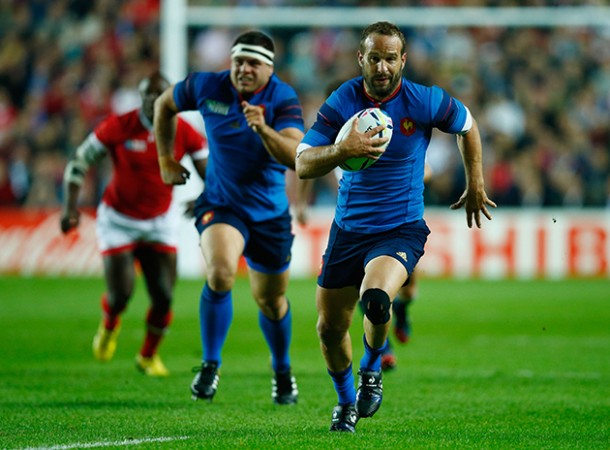The reasons why France fly-half Freddie Michalak has rediscovered his best during this World Cup
Philippe Saint-André hasn’t been given much credit during his four years in charge of France but on one matter he deserves nothing but praise.
He has brought Freddie Michalak back into the fold, rehabilitating the Toulon fly-half after his predecessor, Marc Lievremont, cast him into the international wilderness. Lievremont was not one of France’s more imaginative coaches; in fact he was downright dull, which, allied to his appalling communication skills, made for a man who was never going to be able to handle a maverick like Michalak. Not that he is alone in that regard. Guy Noves, Michalak’s coach for many years at Toulouse, was another whose inflexible outlook on life struggled to accommodate a player outside the norm.
Even the broad-minded Bernard Laporte has what Midi Olympique described recently as a “love-hate relationship” with Michalak. The pair came to metaphorical blows most recently in April, after Laporte had substituted his fly-half early in the second half of the Champions Cup semi-final against Leinster. It was a brave call by Bernie, and a correct one, as Michalak was in meltdown and needed replacing.
Six months on and the Frenchman is on fire. He orchestrated France’s 41-18 World Cup win over Canada last week, kicking 14 points and creating a sumptuous try for Wesley Fofana with a delicious break and offload. When Freddie plays well so does Fofana, because the Clermont centre thrives on the shoulder of a fly-half who lives close to the gain-line. Of course, all fly-halves are crucial to how their team plays but none more so than Michalak. It’s his body language, more than anything, that’s an electrical charge of emotion: positive and it energises team-mates, negative and it enervates.
Possibly no French player other than Louis Picamoles has benefited from the summer training camp as much as Michalak. He’s fit, he’s focused and above all he’s got the full support of his coach. Because Freddie needs to feel loved, it’s what gives him the confidence to express himself. He needs to know that if he does make a mistake in attempting something audacious he’s not going to have a coach on his case, carping, criticising, and eroding that fragile confidence.
PSA has always known the softly-softly approach works best with Michalak. One of his first acts on taking up his appointment as France coach was to dial up a player who had last started a Test in October 2007. “When I called him in 2012 to see if he was still interested in playing for les Bleus, I understood immediately from the tone of his voice that he was,” he explained.
Michalak rewarded PSA’s faith with a sublime performance against Australia in November 2012, scoring 15 points as France crushed Australia 33-6 for their first win in seven years against the Wallabies. Michalak struggled to kick on from that display, partly because of injury but also because even when fit Michalak was Toulon’s second-choice fly-half behind Jonny Wilkinson. PSA could only look on in frustration, aware that he was to some extent to blame having signed the Englishman during his time in charge of the Cote d’Azur club.
But Michalak, who turns 33 next week, has learnt much from Wilkinson, a player with less natural talent than the Frenchman but with a work ethic second to none. In Monday’s Midi Olympique, Michalak’s team-mate and friend Yannick Nyanga explained the positive effect Wilkinson has had on the French fly-half.
“Undeniably being around him (Wilkinson) has had an influence on his goalkicking,” said Nyanga. “Working on a daily basis with him has altered his approach to this part of his game. He’s been inspired by his methods, the extra sessions, where he worked alone for hours on end.”
Michalak has also grown up. Hailed as the golden child of French rugby when he made his Test debut in 2001, a month after his 19th birthday, he sought neither fame nor fortune but was burdened by both. In the end the glare of the spotlight became too much and he fled France for South Africa, enjoying two stints with the Sharks. When he came home in 2012 after the second spell, he did so at the behest of PSA, the World Cup in both their sights. “I’ve returned to France to win it,” declared Michalak.
There remains in Freddie the magician’s touch, but there’s also now a maturity. “He’s lost the boyish carelessness,” said Yannick Bru, France’s forwards coach, last week. “He is a lot more professional, influenced by the great players with whom he’s mixed. With his understanding and feeling for the game, he’s really helped us.”
Or as Freddie’s great friend, Yannick Nyanga, put it: “Like a good wine, he improves with age.”
For the latest Rugby World subscription offers, click here.








